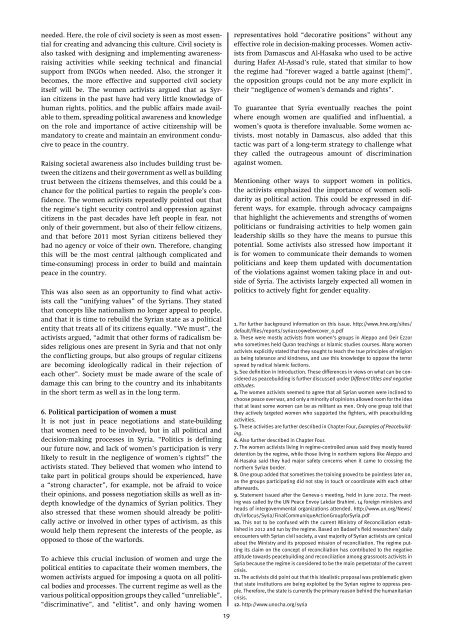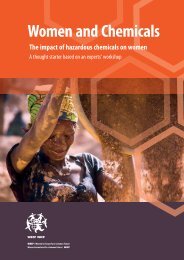future now”
YAO19
YAO19
You also want an ePaper? Increase the reach of your titles
YUMPU automatically turns print PDFs into web optimized ePapers that Google loves.
needed. Here, the role of civil society is seen as most essential<br />
for creating and advancing this culture. Civil society is<br />
also tasked with designing and implementing awarenessraising<br />
activities while seeking technical and financial<br />
support from INGOs when needed. Also, the stronger it<br />
becomes, the more effective and supported civil society<br />
itself will be. The women activists argued that as Syrian<br />
citizens in the past have had very little knowledge of<br />
human rights, politics, and the public affairs made available<br />
to them, spreading political awareness and knowledge<br />
on the role and importance of active citizenship will be<br />
mandatory to create and maintain an environment conducive<br />
to peace in the country.<br />
Raising societal awareness also includes building trust between<br />
the citizens and their government as well as building<br />
trust between the citizens themselves, and this could be a<br />
chance for the political parties to regain the people’s confidence.<br />
The women activists repeatedly pointed out that<br />
the regime’s tight security control and oppression against<br />
citizens in the past decades have left people in fear, not<br />
only of their government, but also of their fellow citizens,<br />
and that before 2011 most Syrian citizens believed they<br />
had no agency or voice of their own. Therefore, changing<br />
this will be the most central (although complicated and<br />
time-consuming) process in order to build and maintain<br />
peace in the country.<br />
This was also seen as an opportunity to find what activists<br />
call the “unifying values” of the Syrians. They stated<br />
that concepts like nationalism no longer appeal to people,<br />
and that it is time to rebuild the Syrian state as a political<br />
entity that treats all of its citizens equally. “We must”, the<br />
activists argued, “admit that other forms of radicalism besides<br />
religious ones are present in Syria and that not only<br />
the conflicting groups, but also groups of regular citizens<br />
are becoming ideologically radical in their rejection of<br />
each other”. Society must be made aware of the scale of<br />
damage this can bring to the country and its inhabitants<br />
in the short term as well as in the long term.<br />
6. Political participation of women a must<br />
It is not just in peace negotiations and state-building<br />
that women need to be involved, but in all political and<br />
decision-making processes in Syria. “Politics is defining<br />
our <strong>future</strong> now, and lack of women’s participation is very<br />
likely to result in the negligence of women’s rights!” the<br />
activists stated. They believed that women who intend to<br />
take part in political groups should be experienced, have<br />
a “strong character”, for example, not be afraid to voice<br />
their opinions, and possess negotiation skills as well as indepth<br />
knowledge of the dynamics of Syrian politics. They<br />
also stressed that these women should already be politically<br />
active or involved in other types of activism, as this<br />
would help them represent the interests of the people, as<br />
opposed to those of the warlords.<br />
To achieve this crucial inclusion of women and urge the<br />
political entities to capacitate their women members, the<br />
women activists argued for imposing a quota on all political<br />
bodies and processes. The current regime as well as the<br />
various political opposition groups they called “unreliable”,<br />
“discriminative”, and “elitist”, and only having women<br />
19<br />
representatives hold “decorative positions” without any<br />
effective role in decision-making processes. Women activists<br />
from Damascus and Al-Hasaka who used to be active<br />
during Hafez Al-Assad’s rule, stated that similar to how<br />
the regime had “forever waged a battle against [them]”,<br />
the opposition groups could not be any more explicit in<br />
their “negligence of women’s demands and rights”.<br />
To guarantee that Syria eventually reaches the point<br />
where enough women are qualified and influential, a<br />
women’s quota is therefore invaluable. Some women activists,<br />
most notably in Damascus, also added that this<br />
tactic was part of a long-term strategy to challenge what<br />
they called the outrageous amount of discrimination<br />
against women.<br />
Mentioning other ways to support women in politics,<br />
the activists emphasized the importance of women solidarity<br />
as political action. This could be expressed in different<br />
ways, for example, through advocacy campaigns<br />
that highlight the achievements and strengths of women<br />
politicians or fundraising activities to help women gain<br />
leadership skills so they have the means to pursue this<br />
potential. Some activists also stressed how important it<br />
is for women to communicate their demands to women<br />
politicians and keep them updated with documentation<br />
of the violations against women taking place in and outside<br />
of Syria. The activists largely expected all women in<br />
politics to actively fight for gender equality.<br />
1. For further background information on this issue. http://www.hrw.org/sites/<br />
default/files/reports/syria1109webwcover_0.pdf<br />
2. These were mostly activists from women’s groups in Aleppo and Deir Ezzor<br />
who sometimes held Quran teachings or Islamic studies courses. Many women<br />
activists explicitly stated that they sought to teach the true principles of religion<br />
as being tolerance and kindness, and use this knowledge to oppose the terror<br />
spread by radical Islamic factions.<br />
3. See definition in Introduction. These differences in views on what can be considered<br />
as peacebuilding is further discussed under Different titles and negative<br />
attitudes.<br />
4. The women activists seemed to agree that all Syrian women were inclined to<br />
choose peace over war, and only a minority of opinions allowed room for the idea<br />
that at least some women can be as militant as men. Only one group told that<br />
they actively targeted women who supported the fighters, with peacebuilding<br />
activities.<br />
5. These activities are further described in Chapter Four, Examples of Peacebuilding.<br />
6. Also further described in Chapter Four.<br />
7. The women activists living in regime-controlled areas said they mostly feared<br />
detention by the regime, while those living in northern regions like Aleppo and<br />
Al-Hasaka said they had major safety concerns when it came to crossing the<br />
northern Syrian border.<br />
8. One group added that sometimes the training proved to be pointless later on,<br />
as the groups participating did not stay in touch or coordinate with each other<br />
afterwards.<br />
9. Statement issued after the Geneva-1 meeting, held in June 2012. The meeting<br />
was called by the UN Peace Envoy Lakdar Brahimi. 14 foreign ministers and<br />
heads of intergovernmental organizations attended. http://www.un.org/News/<br />
dh/infocus/Syria/FinalCommuniqueActionGroupforSyria.pdf<br />
10. This not to be confused with the current Ministry of Reconciliation established<br />
in 2012 and run by the regime. Based on Badael‘s field researchers’ daily<br />
encounters with Syrian civil society, a vast majority of Syrian activists are cynical<br />
about the Ministry and its proposed mission of reconciliation. The regime putting<br />
its claim on the concept of reconciliation has contributed to the negative<br />
attitude towards peacebuilding and reconciliation among grassroots activists in<br />
Syria because the regime is considered to be the main perpetrator of the current<br />
crisis.<br />
11. The activists did point out that this idealistic proposal was problematic given<br />
that state institutions are being exploited by the Syrian regime to oppress people.<br />
Therefore, the state is currently the primary reason behind the humanitarian<br />
crisis.<br />
12. http://www.unocha.org/syria



